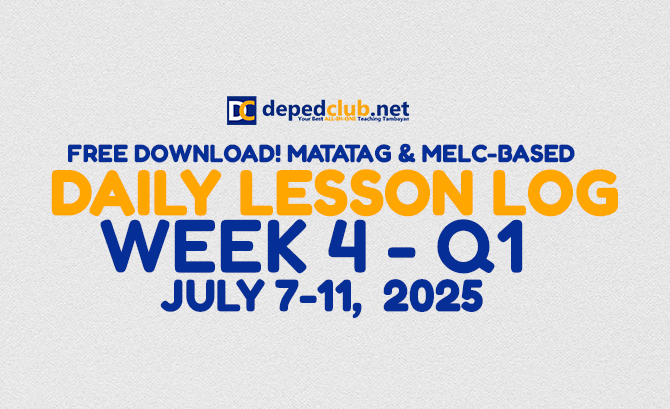K-12 Daily Lesson Logs (DLL’S) are useful and vital resource of our K-12 Teachers. Basically, Daily Lesson Logs (DLL’s) are guides for our teachers’ daily lesson preparation. The Department of Education issued guidelines to institutionalize instructional planning as a critical part of the teaching and learning process in public schools. These guidelines are meant to address teachers’ needs in organizing and managing teaching-learning process in the classrooms.
The latest K-12 Daily Lesson Log contains a reflection part, placed at the bottom of the DLL’s. Through this part, teachers can reflect in students’ performance and their teaching effectiveness. K-12 Daily Lesson Log preparation is part of our K-12 teacher’s basic function as a facilitator of learning and ensure optimum learning outcome inside the classroom. Well prepared and well-planned Daily Lesson Logs (DLL’s) aligned to the competencies of K-12 Curriculum Guides are fundamental process in ensuring the standards of teaching delivery and quality of the teaching-learning process in public schools.
In the ever-evolving landscape of education, one constant remains: the indispensable role of teachers in shaping the minds of future generations. The K-12 Daily Lesson Logs (DLL’s) have emerged as an essential tool that empowers educators and enriches the teaching and learning experience. As we delve into the significance of these logs, it becomes evident that they are not merely administrative requisites but invaluable companions in the journey of education.
 |
| ENGLISH 7-10 DLL Compilation (2nd Quarter) |
NOTE: You must be LOGGED IN to your Gmail account or DepEd Email to download this file.
QUARTER 2 - ENGLISH 7 DLL
- Grade 7 DLL: Quarter 2 Week 1-8 | ENGLISH - DOWNLOAD
What's Inside the MELC'-BASED DLL/DLP FOR GRADE 7
- Recognize main/key ideas
- Note specific details/elements of the text listened to
- Extract information from the text listened to
- Use listening strategies based on purpose, familiarity with the topic and levels of difficulty of short texts listened to
- Use appropriate mechanisms/tools in the library or other sources for locating resources
- Use an electronic search engine to locate specific resources
- Get information from the different parts of a book and from general references in the library
- Gather current information from newspapers and other print and non-print media
- Identify key ideas
- Identify supporting details
- Simplify ideas
- Extract information from a text using a summary, precis, and paraphrase
- Predict the gist of the material viewed based on the title, pictures, and excerpts of the material viewed
- Draw similarities and differences of the featured selections in relation to the theme
- Compare content of materials viewed to other sources of information (print and radio)
- Identify figures of speech that show comparison (simile metaphor, personification)
- Identify figures of speech that show contrast (irony, oxymoron, paradox) Classify sample texts into literal or figurative
- Discriminate between literal and figurative language
- Analyze relationships presented in analogies
- Use non-linear visuals as comprehensive aids in content texts
- Give the meaning of given signs and symbols (road signs, prohibited signs, etc.)
- Transcode orally and in writing the information presented in diagrams, charts, table, graphs, etc.
- Transcode information from linear to non-linear texts and vice-versa
QUARTER 2 - ENGLISH 8 DLL/DLP
- Grade 8 DLL: Quarter 2 Week 1-10 | ENGLISH- DOWNLOAD
What's Inside the MELC'-BASED DLL/DLP ENGLISH FOR GRADE 8
- Transcode information from linear to nonlinear texts and vice-versa
- Explain visual-verbal relationships illustrated in tables, graphs, and information maps found in expository texts
- Use appropriate grammatical signals or expressions suitable to each pattern of idea development: general to particular claim and counterclaim problem solution cause-effect and others
- Share ideas using opinion-marking signals
- Compare and contrast the presentation of the same topic in different viewing genres
- Compare and contrast one’s beliefs/convictions with those presented in a material viewed
- Predict the gist of the material viewed based on the title, pictures, and excerpts
- Discern positive and negative messages conveyed in a material viewed
QUARTER 2 - ENGLISH 9 DLL/DLP
- Grade 9 DLL: Quarter 2 Week 1-8 | ENGLISH- DOWNLOAD
What's Inside the MELC'-BASED DLL/DLP FOR GRADE 9
- Compare and contrast similar information presented in different texts
- Relate text content to particular issues, concerns or dispositions in life
- Explain how a selection may be influenced by culture, history, environment or other factors
- Analyze literature as means of valuing other people and other various circumstances in life
- Analyze literature as means of understanding unchanging values in the VUCA (volatile, uncertain, complex, ambiguous) world
QUARTER 2 - ENGLISH 10 DLL/DLP
- Grade 10 DLL: Quarter 2 Week 1 | ENGLISH- DOWNLOAD
What's Inside the MELC'-BASED DLL/DLP FOR ENGLISH GRADE 10
- Use words and expressions that affirm or negate
- Observe correct grammar in making definitions
- Observe the language of research, campaigns, and advocacies
- Use patterns and techniques of developing an argumentative claim
- Identify parts and features of argumentative essays
- Detect bias and prejudice in the material viewed
- Formulate a statement of opinion or assertion
- Formulate claims of fact, policy, and value
- Employ appropriate pitch, stress, juncture, intonation, etc.
- Observe the correct stance and proper stage behavior as deemed necessary
- Establish eye contact
- Demonstrate confidence and ease of delivery
- Employ the techniques in public speaking in a sample public speaking situation
- Use appropriate multimedia resources that accompany language
- Use the correct sound of English when delivering impromptu and extemporaneous speech
- Make and deliver impromptu and extemporaneous speeches with ease and confidence
- Deliver special speeches like toast and roast speeches, tributes, welcome and closing remarks, speeches to introduce guest speakers/resource persons etc. effectively in varied speech situations
- Deliver self-composed campaign speeches on Advocacies, Social Issues and Concerns



